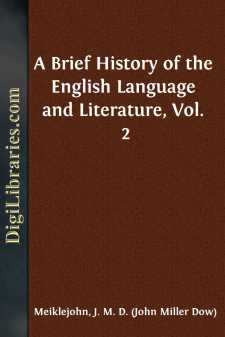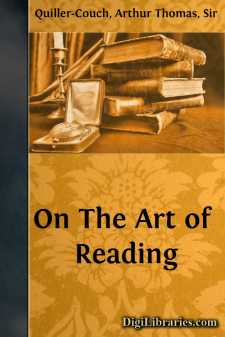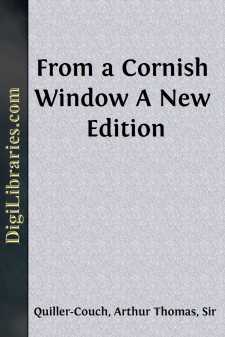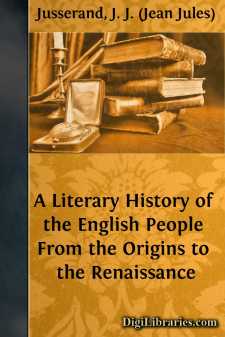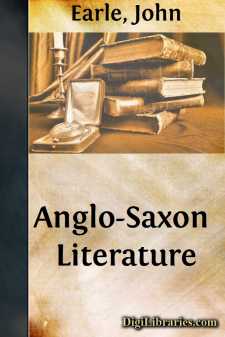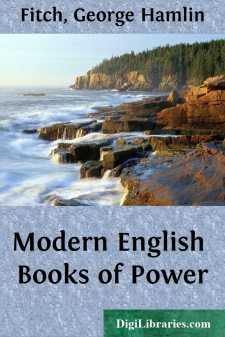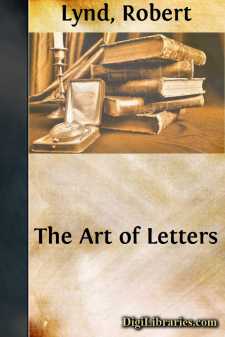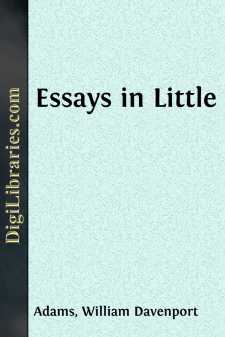Literary Criticism
- American 18
- Ancient and Classical 3
- Asian 1
- Australian & Oceanian 1
- Books & Reading 8
- Caribbean & Latin American 2
- Drama 2
- English, Irish, Scottish, Welsh
- European 7
- General 37
- Horror 1
- Humor 2
- Jewish 2
- Medieval 2
- Middle Eastern 3
- Poetry 7
- Renaissance 6
- Russian & Former Soviet Union 1
- Shakespeare 27
English, Irish, Scottish, Welsh Books
Sort by:
INTRODUCTION. 1. Tongue, Speech, Language.—We speak of the “English tongue” or of the “French language”; and we say of two nations that they “do not understand each other’s speech.” The existence of these three words—speech, tongue, language—proves to us that a language is something spoken,—that it is a number of sounds; and that the writing or printing of it upon paper is a quite...
more...
LECTURE I INTRODUCTORY WEDNESDAY, OCTOBER 25, 1916 I In the third book of the "Ethics", and in the second chapter, Aristotle, dealing with certain actions which, though bad in themselves, admit of pity and forgiveness because they were committed involuntarily, through ignorance, instances 'the man who did not know a subject was forbidden, like Aeschylus with the Mysteries,' and...
more...
DEDICATION. MY DEAR WILLIAM ARCHER, Severe and ruthlessly honest man that you are, you will find that the levities and the gravities of this book do not accord, and will say so. I plead only that they were written at intervals, and in part for recreation, during years in which their author has striven to maintain a cheerful mind while a popular philosophy which he believed to be cheap took possession...
more...
BRITANNIA. I. The people that now occupies England was formed, like the French people, by the fusion of several superimposed races. In both countries the same races met and mingled at about the same period, but in different proportions and under dissimilar social conditions. Hence the striking resemblances and sharply defined contrasts that exist in the genius of the two nations. Hence also the...
more...
by:
John Earle
CHAPTER I. A PRELIMINARY VIEW. Anglo-Saxon literature is the oldest of the vernacular literatures of modern Europe; and it is a consequence of this that its relations with Latin literature have been the closest. All the vernacular literatures have been influenced by the Latin, but of Anglo-Saxon literature alone can it be said that it has been subjected to no other influence. This literature was nursed...
more...
Introduction My aim in this little book has been to give short sketches and estimates of the greatest modern English writers from Macaulay to Stevenson and Kipling. Omissions there are, but my effort has been to give the most characteristic writers a place and to try to stimulate the reader's interest in the man behind the book as well as in the best works of each author. Too much space is devoted...
more...
by:
Voltaire
INTRODUCTION François Marie Arouet, who called himself Voltaire, was the son of François Arouet of Poitou, who lived in Paris, had given up his office of notary two years before the birth of this his third son, and obtained some years afterwards a treasurer’s office in the Chambre des Comptes. Voltaire was born in the year 1694. He lived until within ten or eleven years of the outbreak of the...
more...
by:
Robert Lynd
I.—Mr. Pepys Mr. Pepys was a Puritan. Froude once painted a portrait of Bunyan as an old Cavalier. He almost persuaded one that it was true till the later discovery of Bunyan’s name on the muster-roll of one of Cromwell’s regiments showed that he had been a Puritan from the beginning. If one calls Mr. Pepys a Puritan, however, one does not do so for the love of paradox or at a guess. He tells...
more...
ALEXANDRE DUMAS Alexandre Dumas is a writer, and his life is a topic, of which his devotees never weary. Indeed, one lifetime is not long enough wherein to tire of them. The long days and years of Hilpa and Shalum, in Addison—the antediluvian age, when a picnic lasted for half a century and a courtship for two hundred years, might have sufficed for an exhaustive study of Dumas. No such study...
more...
by:
Emily Hickey
The beginnings of Literature in England. Two poets of the best period of our old poetry, Caedmon and Cynewulf. The language they wrote in. The monastery at Whitby. The story of Caedmon's gift of song.How many of us I wonder, realise in anything like its full extent the beauty and the glory of our Catholic heritage. Do we think how the Great Mother, the keeper of truth, the guardian of beauty, the...
more...


